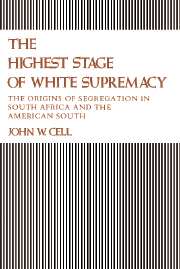Book contents
- Front Matter
- Contents
- Preface
- 1 The Problem of Segregation
- 2 Contemporary Perspectives
- 3 Recent Interpretations of the Origins of Segregation in South Africa
- 4 The Origins of Segregation in the American South: The Woodward Thesis and Its Critics
- 5 The South Makes Segregation: The Economic Interpretation
- 6 The South Makes Segregation: The Social Interpretation
- 7 A Note on Southern Moderates and Segregation
- 8 South Africa Makes Segregation
- 9 Conclusion: Reactions to Segregation
- Notes
- Index
2 - Contemporary Perspectives
Published online by Cambridge University Press: 22 September 2009
- Front Matter
- Contents
- Preface
- 1 The Problem of Segregation
- 2 Contemporary Perspectives
- 3 Recent Interpretations of the Origins of Segregation in South Africa
- 4 The Origins of Segregation in the American South: The Woodward Thesis and Its Critics
- 5 The South Makes Segregation: The Economic Interpretation
- 6 The South Makes Segregation: The Social Interpretation
- 7 A Note on Southern Moderates and Segregation
- 8 South Africa Makes Segregation
- 9 Conclusion: Reactions to Segregation
- Notes
- Index
Summary
Like patterns based on class or caste, race relations are mainly shaped and altered by the internal dynamics of the particular societies in whose institutions color distinctions, once having been imposed by power, have taken root. Racist societies, however, are not isolated, self-contained islands. They participate in an international dialogue, sharing information, attitudes, stereotypes, moral standards, and attempts to resolve problems that they perceive to be common.
For Europeans and their descendants overseas, large numbers of whom were both literate and conscious of world politics, this dialogue had gone on since the beginning of modern history. They continually discussed such questions as policies toward aboriginal inhabitants of settlement colonies; the justification, regulation, and eventually the abolition of slavery; and relations between “civilized” or “advanced” and “uncivilized” or “backward” countries. In some cases, for instance, the establishment of slavery in the New World in the sixteenth and seventeenth centuries, when the recognition that servitude was a problem lagged behind the rapid spread of the system from colony to colony in response to a compelling need for labor, this dialogue was of secondary importance. In other cases, the international climate of opinion forced the pace.
In the late nineteenth and early twentieth centuries this international dialogue on comparative race relations dramatically accelerated toward a shrill climax. Historians have analyzed the debate under familiar headings: Social Darwinism, manifest destiny, the new imperialism, segregation. Both white Americans and white (especially English-speaking) South Africans participated in this discussion.
- Type
- Chapter
- Information
- The Highest Stage of White Supremacy , pp. 21 - 45Publisher: Cambridge University PressPrint publication year: 1982



